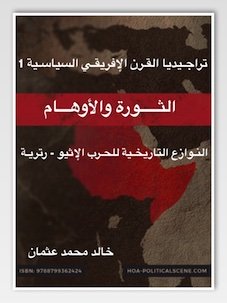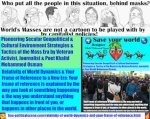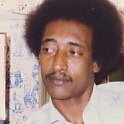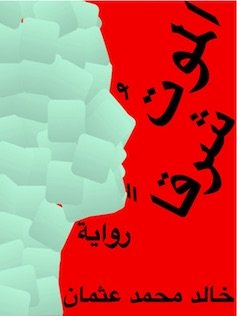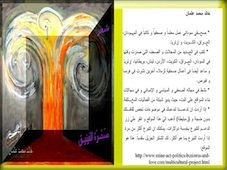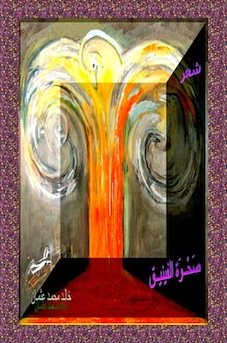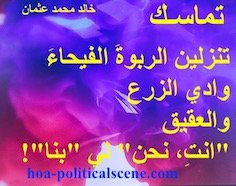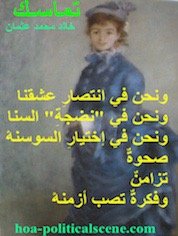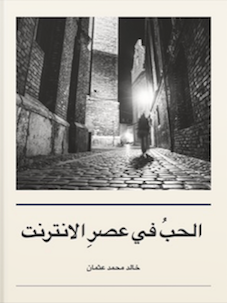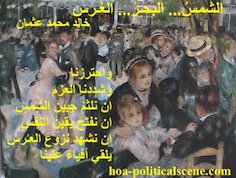HOW MUCH does Facebook pay you when you spend a lot of time to make it a billionaire while you're poor? Do you want to conquer FaceBook, Google, or any social you are using and make them pay you hard currencies for using them? That has a DYNAMIC SYSTEM. Contact Me! GET INSIGHTS ON HOAS ABOUT FACEBOOK.
Sudanese Aid!
The Sudanese Aid, a term that is called for brining aid to Sudan, or assisting Sudan by some aid has different political aims, but not humanitarian. We have seen this through decades of misruling of Sudan by Sudanese sectarian parties and the versions of the Muslim Brothers, the Sudan wing.
 hoa-politicalscene.com/sudanese-aid.html: Sudanese Aid: معونة سودانية. Khalid Mohammed Osman's political sayings in English 1. أقوال سياسية لخالد محمد عثمان بالانجليزية.
hoa-politicalscene.com/sudanese-aid.html: Sudanese Aid: معونة سودانية. Khalid Mohammed Osman's political sayings in English 1. أقوال سياسية لخالد محمد عثمان بالانجليزية.For the Sudanese only: you have never thought of what I have mentioned on this page and the connection of aid to agreements, dear. It never occurred to your collective mind.
Therefore, it would always be preferable to adopt credibility and transparency, when making use of such statements or information by attributing them to whom you cited and sources. I've seen many cite me and forget about references and sources. This is a copyright violation.
Clarifying Sudanese Aid, as a Term!
In this matter of aid to Sudan, I am precisely speaking about the Sudanese Political Aid, but not the humanitarian one.
If I refer to the humanitarian, then that would be only to connect it with political aims... meaning political aims that impact the Sudanese political powers by dependency, when the aid is conditioned.
Thus we have seen the sovereignty in Sudan has never been real, not only during the rule of the Sudanese dictatorial regimes but also during the rule of the sectarian parties through what's called democracy in Sudan.
As I stated so far in the series of articles, which are episodes in the Sudanese sequence of political articles that started by episode 1 and until episode 18, Sudanese Aid, the interior causes of the political problems in Sudan and the complete deterioration is coherent with International economical ambitions or territorial ambitions, whether they are religiously oriented towards Islam, or Christianity.
The use of religion whatever it is in politics, is a clear abuse of the secularity of the state, as a political concept. No religion whatever it is, has rights to interfere in the politics of any state.
The usage of "aid" to construct this term is parallel with the other terms that run in the context of other terms added to "Sudanese" and "politics" to compose different terms that describe the deterioration of the Sudanese political scene and all of the situations of living, which make the people live continuous miseries and catastrophes, since the independence from Britain in 1956.
No one can ever understand why on earth a fast wet fertile land as the land of Sudan ever needs foreign help! Doesn't that sound like the political leaders of Sudan, since independence until now are thieves? In fact, it proves it.
Aid always comes with agendas legalized by political agreements, prior to or after the granting of aid. So, the term "aid" is well connected with "bargains" and "agreements". This is why the Sudanese Aid, as an episode in the sequence has references to other episodes.
It is a continuation to many episodes, notably among them are: episode 17: Sudanese Agreements, with its Arabic version at Sudanese Political Agreements and Sudanese Bargain, with its Arabic version at Sudanese Political Bargain. The number of this episode is yet to come in the alphabetical order of the sequence.
You can't understand it completely without reading the mentioned episodes.
You continue Sudanese Bargain here. The last section you read there is titled "Sudanese Bargain Between Sudanese Political Parties and Foreign Political Groups" and I haven't written about it there.
Here it is and it continues the bargains, or agreements between elements in Sudan and other foreign partners.
Sudanese Aid Between Sudanese Political Parties and Foreign Political Groups!
I meant by this, directly the agreements between the Muslim Brothers, the Sudan wing and other terrorist groups in the area to spread terrorism.
But, let's take this by talking about the bargains and agreements of the Sudanese political parties in power with other foreign parties, or governments, since the independence of Sudan.
I will not mention the details of any agreement, but rather the meanings of those agreements and how they are affecting Sudan's political scene, the Sudanese sovereignty, and the Sudanese decision making, and endangering Sudan by terrible independency on foreign powers.
To your surprise, the first signs of Sudanese Aid between Sudanese political parties and foreign political powers appeared in the framework of the independence of Sudan from England in 1956.
When I was a child, I saw a sign of such agreement on a phrase written by Mohammed Naguib under his photo hanged on the saloon in my first family house. That was my dad's house, where I had been brought up.
The phrase says, "keep this agreement by your union".
So, I asked my dad about the meaning of that phrase and he explained it to me. I didn't understand it at the time, because I had been just a little kid in the kindergarten.
Obviously, I understood after that, when I heard my dad many times while he was reading to me some articles from some papers and magazines. He used to do that every time he got publications from the city bookshop, which was the next to his modern boutique.
I knew then (at that time, before elementary school) there was an agreement between the National Unionist Party of Sudan (NUP) led by Ismael al-Azhari and the Egyptian authorities, which has taken place and appeared even in the name the party has taken, while the Umma Party opposed that agreement.
The NUP has followed that Egyptian orientation after the Egyptian revolution, because it was godfathered by Sayyid Ali al-Mirghani, the leader of al-Khatmiyyah brotherhood, or sect, while the Umma Party obviously acquired the influence of the Ansar sect, led by Abdel-Rahman al-Mahdi.
Although the two parties are sectarian parties, but as the only two right-wing parties with great numbers of followers competition between them has scaled hatreds between them that soured the Sudanese political scene for decades and even ended the first national government, during what's called sovereignty in Sudan.
I just am wondering what sovereingt was that since the Sudanese Aid was tied with political agreements and depends on foreign political powers?
The Umma Party planned a military coup against the government of the NUP, and the coup was led by Abdullah Khalil, who was a follower of the Ansar sect.
Bribery and political fraud had appeared the first time in Sudan at that time inside the parliament of the first democratic period and continued later on all political levels and administration levels to destroy Sudan.
Any party that has been assisted and received aid from Egypt or sects has contributed to the deterioration of Sudan.
Any party that has used the army to get some aid to claim more positions in the government has plotted against Sudan and didn't follow the right pass to politics. We are speaking about the impacts of Sudanese aid on politics, right?
What can you say of two Sudanese sectarian parties, which are religious elites that have virtually controlled Sudan's political scene until the last decade of the 20th century to get Sudan into these bad conditions we see nowadays?
What can you say when you know that the first coup in Sudan has come to power assisted by the Umma Party and the last coup has come to power assisted by the same party.
The first coup occurred when the DUP under the influence of al-Khatimiyyah tried to fulfill the agreement with Egypt.
The third coup occurred when the leader of the al-Khatimiyyah sect reached a peace agreement with John Garang, the leader of the Sudanese People's Liberation Front (SPLM) to end the civil war in Sudan?
Is it a coincidence?
How could any political competiton, or envious behaviors between the leaders of the two sects destroy Sudan this way?
Sudanese Aid Between Sudanese Muslim Brothers and Terrorist Groups!
The first Sudanese Aid of its kind was during the formation of the Muslim Brothers Party in Sudan with the influence of the Egyptian Muslim Brothers group.
OK, before continuing this section of the long article, let me say this:
The formation of political parties on religious ground violates the terms of the secular state. This is one thing to notice.
The second is the formation of local parties with foreign agendas and connections with foreign powers... the DUP, as another example and the Ba'ath, as a third example, and the Nasiri party, as a fourth example. This means that the local parties with foreign interests are agents of foreign powers.
The national constitution should ban the formation of political parties on these grounds I mentioned a long time ago.
Although the Muslim Brothers of Sudan, or what I call the Muslim Brothers, Sudan wing has been created with foreign interests. They found great support from Hassan al-Banaa and Seid Goutb. The first was the spiritual leader of the Egyptian Muslim Brothers and the second was the political leader.
They didn't shift to al-Qaida... but, they developed interests with other similar groups to create it during pilgrimage conferences in Jeddah, with the interests to fight communism in Afghanistan and spread Islamic teaching by force.
In their progress along the way they developed all of their interests in what I call "conspiracy theory" and they use their own Muslim Brothers' conspiracy theory to achieve their goals, with the help of foreign groups that belong to the same Islamic doctrine, although they are far away from Islam. Their behaviors prove that.
Through the Sudanese Aid, they had from other groups they invented two ways of policy that depends on strategic and tactical procedures. Doing their strategies and tactics they implanted the policy of political mentality absenteeism with the Sudanese sectarian parties, since independence.
However, while doing that with other similar religious parties, they planned a hidden conspiracy scheme on strategies and tactics to burn the political stages in Sudan and to burn the sectarian parties at the same time.
They used the tactics of what I call the Muslim Brothers octopus in Sudan, during the earlier 30 years after independence to change their party name from the Muslim Brothers to the Islamic Convention Front during the era of dictator Jafar al-Numeri and then changed it again to the National Islamic Front (NIF) during what's called the third democracy in Sudan.
They worked continuously to topple the government of the brother-in-law of their leader Hassan al-Turabi and they used their elements in the Sudanese army under the command of Omar al-Bashir to achieve the military coup in 1989.
They didn't achieve the coup only to throw the prime minister out of power, but also to topple at the same time the peace accord achieved by the leader of the Unionist Democratic Party and the Sudanese People's Liberation Movement, which meant at that time a reverse attempt to retreat from the Sharia Laws.
During the rule of the military coup, under the leadership of what's called the National Congress Party, they worked at the level of the military religious regime to invite many Islamic groups and similar Islamic powers to work in Sudan.
The leader of al-Qaida built the airport of Port Sudan and they built also many other economical projects run by what's called Islamic banks.
They shared all of the Sudanese Aid for their own interests to strike the national Sudanese economy and replace it by their own economy by the use of the Islamic banks, through which they have controlled the currency market to destroy the values of the Sudanese pound.
THIS SECTION IS COMENING SOON
References of Sudanese Aid - المعونة السودانية
The Arabic version of Sudanese Aid is at Sudanese Political Aid.
The article has references, as I have stated in the episodes of the sequence of the Sudanese political articles. Here's are some resources in the sequence.
The series in sequence 1 includes Sudanese political articles in English, Sudanese Arabic political articles, Sudanese commentaries and Sudanese comments, the loyal readers of the HOA Political Scene Newsletter and I have written on the HOA Political Scene Blog.
The HOA Index includes also Sudanese Commentaries and the Sudanese Comments. These two indexing pages are episodes in the Sudanese sequence of articles.
They make the HOA Network bilingual with the Arabic HOA and the English Bilingual HOA. on the cultural section of the network at HOAs English Literature.
The readers of the Horn of Africa's Journal and the loyal visitors of HOA Political Scene have already built many categories on the Arabic HOA Political Scene at Readers Comment, Readers Read Good, Readers Write Comments and Readers Write Good.
They also add pages to this network at: Write about Chad, Write about Djibouti, Write about DRC, Write about Eritrea, Write about Ethiopia, Write about HOA, Write about Kenya, Write about Somalia, Write about Sudan and Write about Uganda.
The series of articles are in many episodes in the sequence of Sudanese articles and commentaries. This sequence alone has more than 200 episodes.
The work continues on the Sudanese sequence of political articles to complete the edition of it in an alphabetical and numerical order, as you see from the alphabet of the second term and the numbers.
This episode is connected with all of the episodes from episode 1 to the end. The episodes are at:
Episode 1: Sudanese Abilities| Episode 2: Sudanese Absence| Episode 3: Sudanese Abuse| Episode 4: Sudanese Achievements| Episode 5: Sudanese Actions| Episode 6: Sudanese Activities| Episode 7: Sudanese Administration| Episode 8: Sudanese Advantages| Episode 9: Sudanese Adversity| Episode 10: Sudanese Advices| Episode 11: Sudanese Advocacy| Episode 12: Sudanese Affairs| Episode 13: Sudanese Affiliation|
There are some Arabic versions of some of these episodes at:
Sudanese Political Abilities| Sudanese Political Absence| Sudanese Political Abuse| Sudanese Political Achievements| Sudanese Political Actions| Sudanese Political Activities| Sudanese Political Administration| Sudanese Political Advantages| Sudanese Political Adversity| Sudanese Political Advices| Sudanese Political Advocacy| Sudanese Political Affairs| Sudanese Political Affiliation| Sudanese Political Affliction|
The organization of the Sudanese political articles goes further to cover the following episodes:
Episode 15: Sudanese Aggression| Episode 16: Sudanese Agitation| Episode 17: Sudanese Agreements| Episode 18: Sudanese Aid| Episode 19: Sudanese Aims| Episode 20: Sudanese Alarm| Episode 21: Sudanese Alerts| Episode 22: Sudanese Allegations| Episode 23: Sudanese Allies| Episode 24: Sudanese Alternatives| Episode 25: Sudanese Ambitions| Episode 26: Sudanese Amnesty| Episode 27: Sudanese Analyses| Episode 28: Sudanese Anecdotes| Episode 29: Sudanese Anger| Episode 30: Sudanese Angles|
As well as Sudan, the organizational work continues to build other sequences with episodes for the other states in the Horn of Africa, including Djibouti, Eritrea, Ethiopia, Kenya, Somalia, Somaliland, South Sudan, and Uganda. Chad, or Tchad and the Democratic Republic of Congo (DRC) are supplementary.
This is a Horn Africas Network.
Your Opinion on Sudanese Aid Counts!
Whether you liked Sudanese Aid, or want, you can use the following form to write comments on SUDANESE AID. I personally value your comments on Sudan, which make the Sudan Online together with the Sudanese Online platform on the HOA Political Scene invaluable.
You can also watch SUDANESE AID on documentary film at TVCinemaApp.com.
Have A Great Story About This Topic?
Do you have a great story about this? Share it!
Did you get any of my books from Apple Books?
Click here to tell me & get some free books. Fill the form.
رواية "الموتُ شرقاً" تكشف لك سرّ الموت الشرقي التراجيدي المستمر للإنسان
احصل علي الرواية الآن واكتشف إنهيار القواسم المشتركة، واستلهم إبداعا يشبه الأسطورة في النص الروائي
"Follow", "like", "tweet", or "pin" the pictures to express your love! Thanks
TweetHorn Africa's Political Tragedy
Love in the Internet Time on Apple Books
Rising of the Phoenix Poetry on Apple Books
Free Poetry Picture Book
Free poetry picture book on Apple Books. You can use the images on public places for your customers to enjoy, while taking coffee.
The French & Spanish Versions
You can work the French versions and the Spanish versions of the two books above with me on, one on one bases. Contact Us.
HOAs Political Poetry Imaged
I'll be thankful, if you get one of my books.
My Books!
Publish Your BookLet's be the publishers of your book. Use the form at Contact Us.





